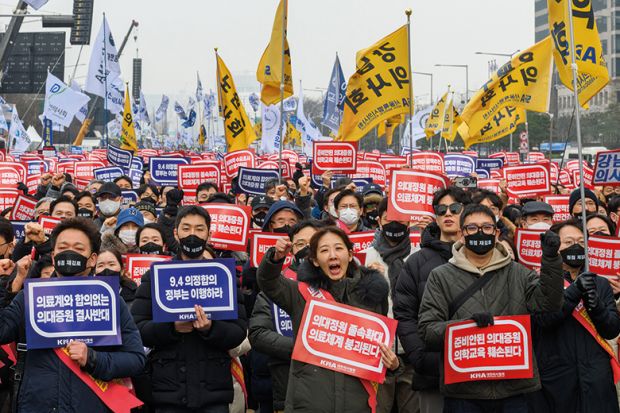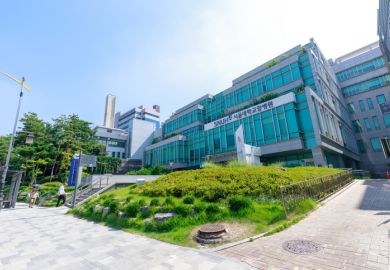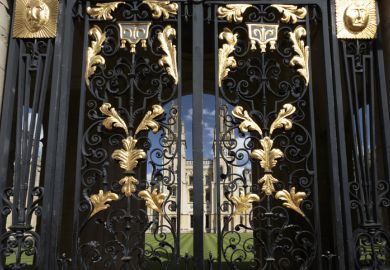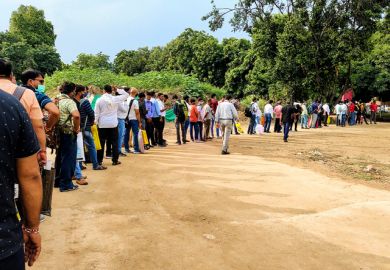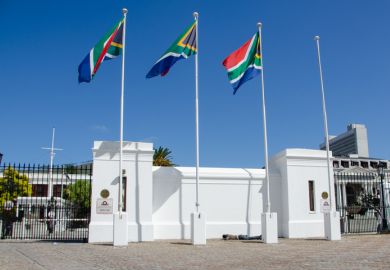On the face of it, the plan by South Korea’s president Yoon Suk-yeol to increase the number of doctors being trained at the country’s medical schools sounded like a winning way to get the public onside ahead of a parliamentary election.
In reality, by joining the long line of politicians who have tried to change the status quo surrounding medical admissions, Mr Yoon further turned the public against him, contributing to the resounding defeat his party, the People Power Party, suffered in this month’s election to retain control of parliament. In South Korea, it seems, attempts to reform medical education are doomed to fail.
From the outset, Mr Yoon was facing a number of crises, including high inflation and a corruption scandal revolving around his wife’s handbag. Tangential questions around medical school admissions should have been the least of his problems, until he entered the lion’s den of South Korea’s highly privatised healthcare system, which doctors are known for fiercely gatekeeping.
The government’s plan to increase places by 2,000, announced in February, resulted in 12,000 junior doctors walking out for over six weeks, senior doctors threatening to resign en masse and a burgeoning medical crisis as the public suddenly found themselves unable to access healthcare. The president’s plan had backfired.
“Ordinary people, who wouldn’t otherwise be interested in policy matters, simply experienced first-hand the consequences of the strike,” said Byunghwan Son, director of Asia-Pacific and north-east Asian studies at George Mason University. “Surgeries got cancelled. Treatments were delayed.”
With one of the lowest doctor-to-patient ratios among developed countries, a rapidly ageing population requiring greater medical attention and only 3,058 students admitted to medical schools each year, reforms are sorely needed in South Korea and are generally supported by the public. The medical profession is also popular, with applications far outnumbering available places.
But attempts to reform medical school quotas have caused headaches for a succession of Korean leaders, with doctors vehemently opposed to any increases. They argue that the government needs to improve working conditions and pay before increasing numbers. Their critics say doctors are trying to avoid increased competition within the profession.
Either way, the Korean Medical Association – the organisation behind the strikes – is a powerful force. “The size of medical schools has been kept quite small in large part because politically influential doctors have been staunch opponents to any increase in that,” said Dr Son. “They wouldn’t hesitate to make a political scene, such as staging protests and strikes, to make their voices heard. And that’s been proven effective.”
In 2020, thousands of doctors walked out in the midst of the Covid-19 pandemic after the former government announced plans to build more medical schools and lift the admissions cap. In the end, politicians caved to the medical community’s demands and scrubbed the plans. This marked 14 years since policymakers had first attempted to increase medical school quotas.
Although only one of many factors contributing to the governing party’s electoral defeat by its liberal opposition, the Democratic Party, the recent strikes and Mr Yoon’s reaction to them have added to his unpopularity, according to academics. While the “vast majority” of people “tend to support the government’s policy”, they “are not happy about the government’s deadlock with doctors and failures in communication with the public”, said Youngmi Kim, senior lecturer in the department of Asian studies at the University of Edinburgh.
“President Yoon’s appearance with the press was too late, and the message was ambiguous in terms of room for negotiation,” added Yong-Chool Ha, director of the Center for Korea Studies at the University of Washington. “I do not think this issue has been critically affecting the election outcome, but it must be an important part of the overall negative perception of President Yoon’s handling of issues.”
Now, in the wake of a resounding defeat for his party, Mr Yoon looks set to become a lame duck president, unable to advance significant reforms in the final three years of his five-year term. That is likely to include the medical school reforms, leaving the sector untouchable. “A likely path going forward would be for the embattled government to give in and the situation returning to the status quo,” said Dr Son.
POSTSCRIPT:
Print headline: Row over doctors’ training thwarts Korean president
Register to continue
Why register?
- Registration is free and only takes a moment
- Once registered, you can read 3 articles a month
- Sign up for our newsletter
Subscribe
Or subscribe for unlimited access to:
- Unlimited access to news, views, insights & reviews
- Digital editions
- Digital access to THE’s university and college rankings analysis
Already registered or a current subscriber? Login
